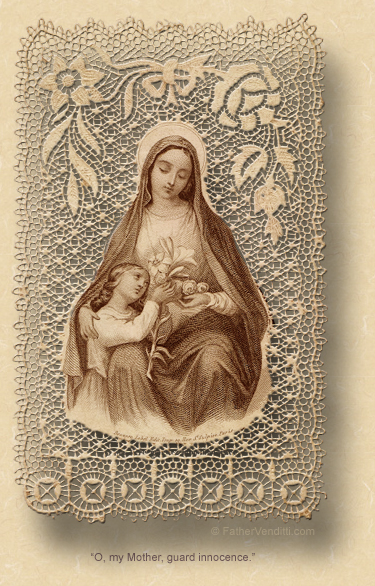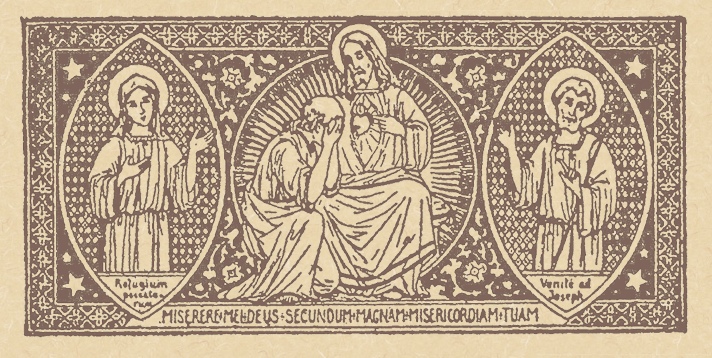I Firmly Resolve, with the Help of Thy Grace, to Avoid the Near Occasion of Sin.
The Fourth Wednesday of Lent.*
Lessons from the feria, according to the ordinary form of the Roman Rite:
• Deuternonomy 4: 1, 5-9.
• Psalm 147: 12-13, 15-16, 19-20.
• Matthew 5: 17-19.
Lessons from the feria, according to the extraordinary form of the Roman Rite:
• Exodus 20: 12-24.
• Psalm 6: 3-4.
• Psalm 102: 10.
• Matthew 15: 1-20.
The Fourth Wednesday of the Great Fast; Mid-Lent;** and, the Feast of the Holy Martyr Theodotus, Bishop of Cyrene.
Lessons for the Presanctified,*** according to the Ruthenian recension of the Byzantine Rite:
• Genesis 9: 18—10: 1.
• Proverbs 12: 23—13: 9.
FatherVenditti.com
|
 9:55 AM 3/2/2016 — Both lessons—from Deuteronomy and Matthew—remind us of the necessity of obeying the Commandments. Nothing earth-shattering in that. Perhaps we read these lessons today lest anyone become confused as a result of yesterday's lesson, in which our Lord cancels the Jewish ethic of an eye for an eye with his own, unyielding prescript about forgiveness. None of us should have walked away from that with the notion that the Commandments need not be obeyed; perhaps the Roman Missal just wants to make sure. 9:55 AM 3/2/2016 — Both lessons—from Deuteronomy and Matthew—remind us of the necessity of obeying the Commandments. Nothing earth-shattering in that. Perhaps we read these lessons today lest anyone become confused as a result of yesterday's lesson, in which our Lord cancels the Jewish ethic of an eye for an eye with his own, unyielding prescript about forgiveness. None of us should have walked away from that with the notion that the Commandments need not be obeyed; perhaps the Roman Missal just wants to make sure.
But tucked away in our Lord's little sermon today is the concept of the occasion of sin. In our Act of Contrition we routinely promise our Lord that we will avoid them, but we don't often consider how prevalent they can be. Avoiding occasions of sin requires forethought, and so often our sins are the result of having none. Someone who find himself stumbling upon some pornographic web site while using his computer in the evening hours when vulnerability to the sins of the flesh is most common may have to make a resolution not to touch his computer during those hours of the night; that would be a decision he would make in order to avoid an occasion of sin.
Part of the problem is that occasions of sin are subjective: what's an occasion of sin for one person may not be for another. Our eating habits can serve as a good analogy here: I'm a diabetic, and I also have no stomach, having had much of those bits surgically removed; so, when someone puts a slice of double-fudge chocolate cake in front of me, it doesn't tempt me because I know from experience that even just one bite could make me violently ill for the rest of the day; but, someone else may find that slice of cake difficult to resist. In the same way, what's an occasion of sin for one person may not be for another. Another analogy: someone who is not an alcoholic can have a glass of wine with his meal with no consequences, but an alcoholic cannot because even just one sip could result in a binge that would lead to a relapse into drunkenness.
When our Blessed Lord, in his little homily today, says that “whoever breaks one of the least of these commandments and teaches others to do so will be called least in the Kingdom of heaven” (Matt. 5: 19 RM3), He's not talking about someone overtly going around saying, “Let me teach you to break the Commandments”; He's talking about how easily it is for us to—often unwittingly—place someone else in what's an occasion of sin for them, even it is isn't one for us. A text message of a risque nature, for example, may not have any effect on us, but sent to someone else could be an occasion of impurity for that person.
Remember the little Examination of Conscience cards I was giving out during Advent? There's a question on there which asks us to consider whether we've done anything to lead someone else into an occasion of sin: that's because there are things we could say or do which may have no moral implications for us, but which could lead someone else into a temptation toward sin. How are we supposed to know what might be an occasion of sin for someone else? We can't know. That's why our Lord is so forceful in His words today: when dealing with the souls of others, extreme caution and prudence is always indicated.
Let us ask our Lord today not only for the courage to avoid whatever may lead us into sin, but for an increase in the virtue of prudence, so that nothing we say or do could possibly be an occasion of sin for anyone we may meet along the way.

* Today is what the Roman Missals refer to as "Wednesday of the Third Week of Lent." Cf. the post here for an explanation of why that designation is rejected on this site.
** In the Byzantine Tradition, the feast of Mid-Lent marks the exact half-way point between the first day of Lent (the Monday after Cheesefare Sunday) and Pascha. It is on this day that the litany for those about to be baptized begins to be chanted at services.
*** In the Byzantine Tradition—as in most Eastern Christian traditions, both Orthodox and Catholic—the Eucharist is not celebrated on the weekdays of the Great Fast. In some traditions, the faithful are expected to fast from the Blessed Eucharist during this time, abstaining from Holy Communion except on Saturdays and Sundays.
In other traditions, including the Ruthenian recension, Holy Communion may be distributed to the faithful daily provided that the Divine Liturgy is not celebrated. On Wednesday and Friday evenings, the Divine Liturgy of Presanctified Gifts is celebrated, consisting of a form of Solemn Vespers coupled with a Communion Service in which the Eucharist confected on the previous Sunday may be received by the faithful. On the other weekdays, another service—usually the Sixth Hour of the Divine Office or a simpler service called "Typica"—may be celebrated at which Holy Communion may also be offered to the faithful. Notice that the readings for these services do not include a Gospel lesson; a Gospel would only be sung on significant Holy Days or during the Presanctified Liturgies of Holy and Great Week.
|

